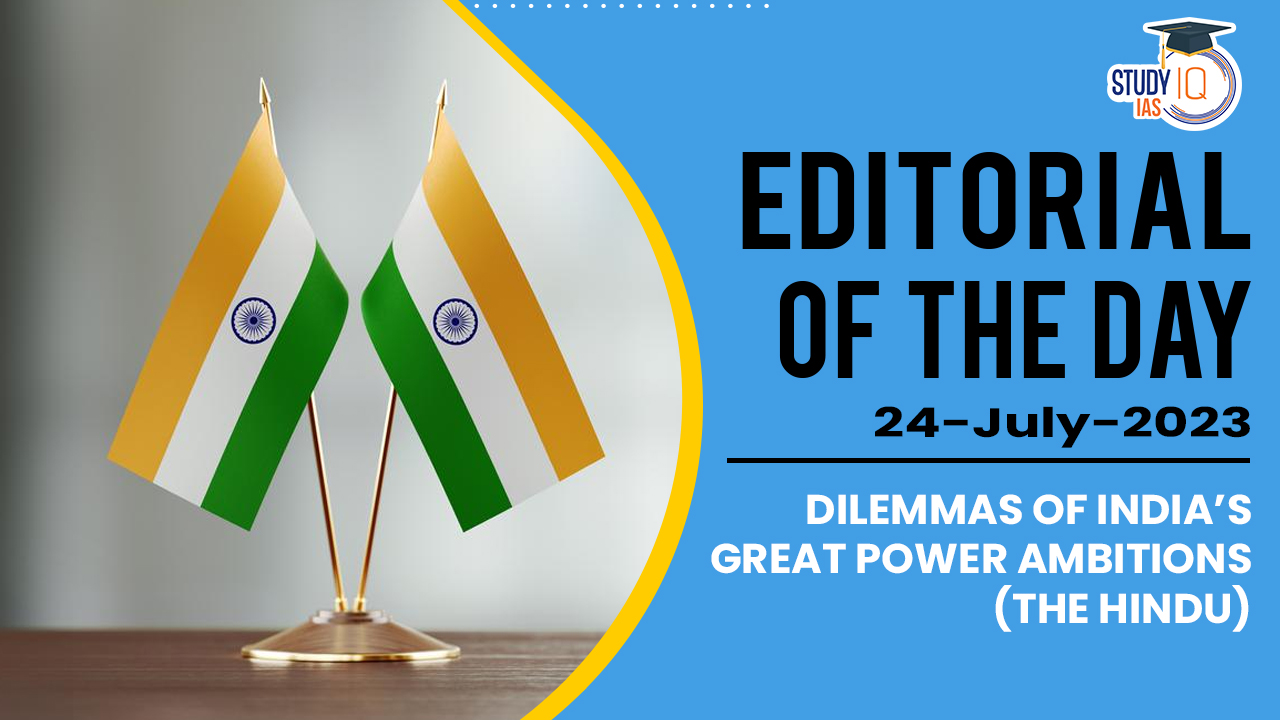Context: The article discusses the question of what kind of global power India should aspire to be. It presents two contrasting viewpoints on this matter. First, the Great Power Aspiration: where India should assert its growing power on the international stage and strive to become a great power. This would involve actively participating in global affairs, shaping the world order, and projecting influence internationally and Second, Focus on Domestic Development: where India should prioritize the upliftment of its millions of people living below the poverty line, improve governance within the country, and address internal challenges before engaging extensively in global affairs. The article suggests that both perspectives present a false binary. Instead, it advocates for a proactive and critical engagement with the challenges and opportunities presented by India’s rise as a global power. It acknowledges that India’s domestic limitations will have an impact on its ability to exert influence on the world stage. However, it argues that completely shying away from becoming a ‘global rule shaper’ would also be a strategic mistake. Overall, the article calls for a balanced approach that takes into account the potential impact on both the world order and India’s large and growing population.
Decoding the Editorial
The article explores the aspirations for India as a global power and the kind of role it should seek to play on the international stage.
Power and its Consequences:
- India’s Growth and Development:
- The article highlights India’s transformation over the past three decades, from a weak and poor country in 1991 to a significant global player in 2023.
- India has seen a substantial increase in India’s foreign exchange reserves, nominal GDP, which have played a crucial role in shaping the country as the world’s fifth-largest economy.
- The economic reforms initiated after the 1991 crisis have contributed to higher GDP growth and poverty reduction.
- Diplomatic and Military Strength:
- India’s military capabilities have grown, including the possession of a considerable number of nuclear weapons.
- The country has also built strong relationships with several powerful states globally, including the United States.
- Geopolitical Importance:
- India is recognized as one of the pivotal “swing powers” in the contemporary international system.
- Its strategic location and its ability to navigate between different sides in global politics have drawn attention from major players like the U.S., the West, and Russia.
- Mediation Role:
- India is increasingly using the language of mediation in global crises, positioning itself as a bridge between different regions and indicating its role as a significant “pole” in world politics.
- It is suggested that India should mediate between Ukraine and Russia in the context of the Ukraine war.
- Poverty and Development Disparities:
- While India has made remarkable progress in various aspects, including national power and international standing, it still faces challenges related to poverty, as tens of millions of people continue to live in impoverished conditions.
Two sides of the same coin:
- Disparities in Economic Well-being:
- Despite being the fifth largest economy in the world, India faces significant disparities in GDP per capita compared to some other countries like Bangladesh.
- This indicates that economic growth and military strength alone do not necessarily translate to better well-being for the citizens.
- Infrastructural and Governance Challenges:
- India grapples with major infrastructural and governance issues, such as corruption and inadequate preparedness for natural calamities, which can divert attention from global matters and foreign policy.
- Focus on Poverty Reduction:
- India’s political class is heavily focused on reducing poverty and improving the well-being of its large population living below the poverty line.
- This emphasis on domestic challenges can limit attention and resources allocated to external engagements.
- Limited Political Will:
- Foreign policy in India is often managed by career bureaucrats due to the lack of sufficient attention and political will from the political leadership.
- This can result in risk-averse decision-making and a lack of proactive engagement on the global stage.
- Economic Constraints on Foreign Policy:
- A weak domestic economy hampers India’s ability to allocate adequate resources for its foreign policy objectives.
- The Ministry of External Affairs receives a relatively small percentage of the overall budget, which may not align with the country’s growing global stature and aspirations.
- Distracted Political Elite: The combination of domestic challenges and limited resources may lead the political elite to prioritize more immediate domestic concerns over pursuing the grandeur of great power status.
Should India Embrace Global Power?
- Embracing Global Power:
- The article presents a perspective advocating that India should not shy away from shaping the global order despite its domestic challenges.
- It argues that being unwilling to engage and shape the world order would be a strategic mistake for India.
- Rule Shaper vs. Rule Taker:
- If India does not actively participate in shaping global rules, it will end up being a passive rule taker, subject to decisions made by other powerful nations.
- Foreign Policy Objectives:
- India’s engagement in shaping the global order is seen as crucial for achieving its foreign policy objectives, which have significant implications for economic growth, security, and geopolitical interests.
- India’s Impact on the World Order: The article highlights that India’s influence on the world order is inevitable given its size, ambition, and role in a globalized world.
- Domestic Context: It is argued that India’s ability to shape international politics should be closely linked to its domestic context and aimed at promoting the well-being of its people.
- Strategic Engagement: The article suggests that India’s assertiveness on the global stage is not driven by nationalistic pride but rather by strategic considerations.
Overall, the article supports the idea that India should actively embrace its power and engage in shaping the global order, considering its domestic context and pursuing foreign policy objectives that align with the welfare of its people. It advocates for a balanced approach where India’s influence on the world stage is a reflection of both its power and its commitment to domestic growth and well-being.


 Serious Fraud Investigation Office (SFIO...
Serious Fraud Investigation Office (SFIO...
 Article 142 of Indian Constitution, Sign...
Article 142 of Indian Constitution, Sign...
 Pakistan-Occupied Kashmir (PoK): History...
Pakistan-Occupied Kashmir (PoK): History...





















